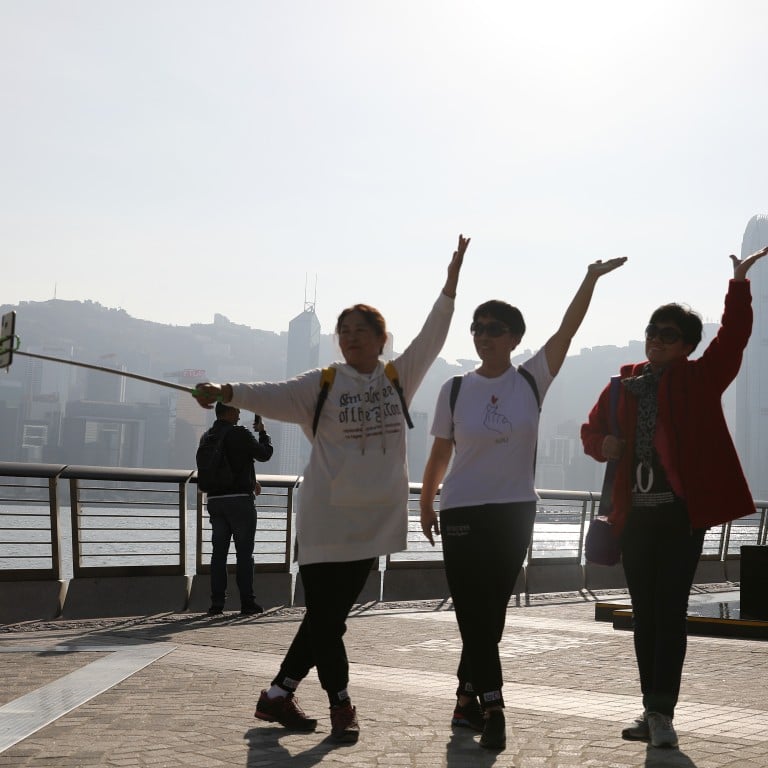
Insurers boosted by sale of tax-deductible products to Hongkongers amid decline in mainland Chinese life insurance purchases
- Mainland Chinese spending on life policies in city fell by 29 per cent in third quarter
- First-quarter sales of tax-deductible products will be strong, Prudential Hong Kong’s CEO says
Insurance companies shifted their attention to Hongkongers following a sharp decline in sales to mainland Chinese visitors to the city, and focused on selling tax-deductible medical and retirement products in the second half of last year.
The number of mainland Chinese tourists coming to Hong Kong declined amid the city’s worst political crisis in decades, now in its eighth month. According to the latest data available, their spending on life policies in the city also dropped, falling in the third quarter of last year by 29 per cent when compared with the previous three-month period. They spent HK$9.7 billion (US$1.2 billion) during the July to September period, down from HK$13.6 billion in the second quarter, according to the city’s insurance authority. On an annual basis, the third-quarter sales were down by 17 per cent.
The number of mainland tourists to Hong Kong dropped 55 per cent from more than 1 million during the 2018 Christmas holiday period – December 21 to 26 – to 450,000 last year, according to the Hong Kong Immigration Department. Between December 29 and January 1, their numbers dropped even further, by 63 per cent from 800,000 in 2018 to 300,000 this year. In November, only 1.93 million mainland tourists visited Hong Kong, a drop of 58.4 per cent from 4.63 million in the same month in 2018, according to the Hong Kong Tourism Board.
Mainland Chinese tourists must buy insurance products in person, as required by Hong Kong regulations.
“The overall insurance industry in Hong Kong reported strong growth in the first half of last year, but the situation turned around in the second half because of the social unrest that started in mid 2019,” said Derek Yung Kai-ming Prudential Hong Kong’s chief executive.
The insurer stepped up efforts to sell the two tax-deductible pension and medical products to Hongkongers in the second half of 2019, a strategy that has helped it compensate for loss of business from mainland Chinese buyers, Yung said.
“Luckily, we promoted the tax-deductible medical scheme, as well as the tax-deductible annuity product. Sales of these two types of products to Hongkongers have been strong because of tax incentives,” he added.
The schemes, launched in April last year, have encouraged people to buy medical products under the voluntary health insurance scheme (VHIS), as well as certain qualified retirement products.
All you need to know about Hong Kong’s new medical and retirement programmes
“Our VHIS, deferred annuity and travel insurance products sold very well in 2019, which partially offset the business drop in the mainland Chinese visitor segment, maintaining overall business growth compared with the previous year,” said Sally Wan, CEO of AXA Hong Kong and Macau.
Eric Hui Kam-kwai, CEO of Zurich Insurance (Hong Kong), said insurance brokers had sold more life, medical and other protection to Hong Kong policyholders over the last six months.
“The brokers are very smart – they switched their sales strategy quickly. While they found there were fewer mainland visitors amid the protests, they started to sell other medical, savings and retirement products to Hong Kong policyholders. The government tax incentives also helped boost the demand for retirement and medical products. As such, I am still cautiously optimistic about the outlook for the insurance industry in 2020,” he said.
Hong Kong tax-deductible schemes find traction in first two weeks since launch
“The first-quarter sales of the two tax-deductible products will be strong, as many people would like to buy the products before the end of March to enjoy tax benefits for the current financial year ending in March. In addition, the social unrest has also calmed down recently, which will help encourage mainland visitors to come back to buy Hong Kong policies,” Prudential’s Yung said.
Meanwhile, the tax-deductible voluntary Mandatory Provident Fund had received a total of HK$634 million from 22,000 employees as of the end of November, according to Mandatory Provident Fund Schemes Authority chairman David Wong, who revealed the data on Sunday in a blog on the pension regulator’s website.


